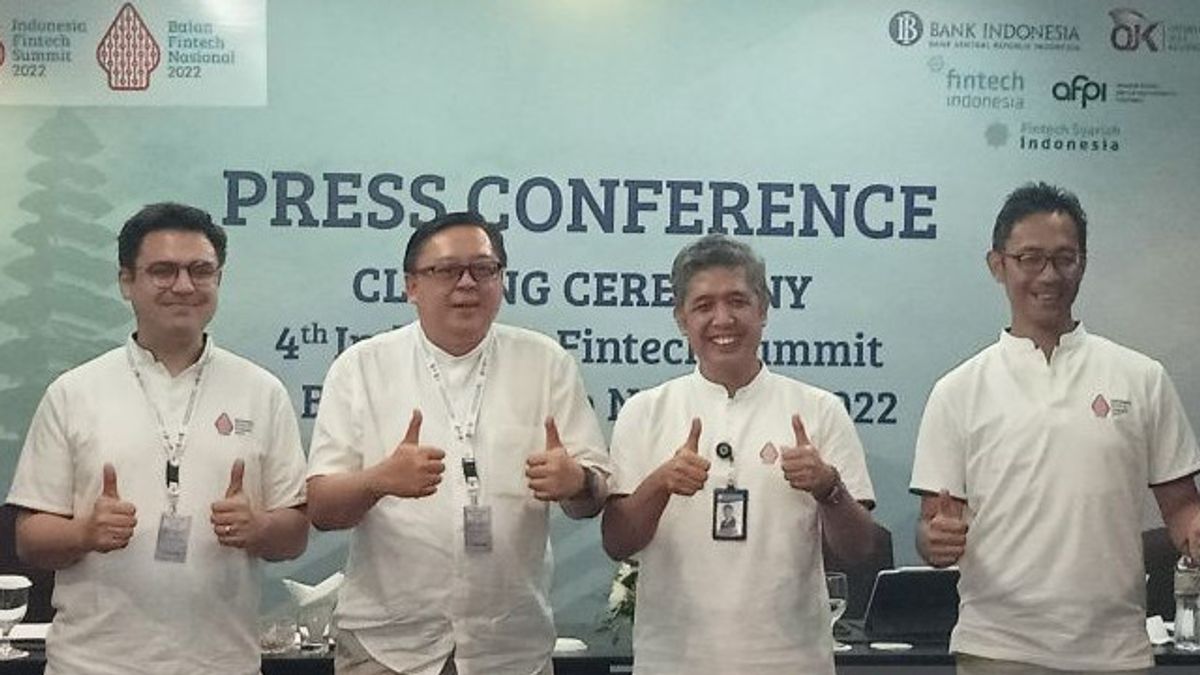YOGYAKARTA - The 2022 National Fintech Month (BFN) event held by the collaboration of Bank Indonesia (BI), the Financial Services Authority (OJK), the Indonesian Fintech Association (Aftech), and the Indonesian Joint Funding Fintech Association (AFPI) in Yogyakarta became a catalyst for national economic recovery.
Aftech's Secretary-General, Budi Gandasoebrata, said that the government, associations, and digital financial business actors (fintech) continue to consistently encourage fintech education which is expected to support national economic recovery.
"BFN seeks to mainstream various issues in the fintech sector so that people are more familiar with various fintech, benefits, and risks. From the enthusiasm of the community, we see BFN as a catalyst in efforts to recover the national economy," Budi said in a statement quoted by Antara, Tuesday, December 13.
Starting with the 4th Indonesia Fintech Summit (IFS), a meeting forum for leaders of financial institutions, associations, and local and foreign fintech actors, BFN 2022 which lasted for a full month closed on December 12 bringing together fintech activists from various countries through a series of webinars.
The 4th IFS and BFN 2022 events are a continuation of a series of annual educational and discussion programs, this year focusing on efforts to recover the national economy with the theme'moving Forward Together: The Role of Digital Finance & Fintech in Promoting Resilient Economic Growth and Financial Stability'.
He explained that BFN has successfully educated more than 1.5 million residents. In addition to education, the program offers 232 job vacancies from Indonesian fintech companies.
"We believe that future fintech opportunities are increasingly unlimited, its utilization has been applied in almost every public consumption activity. We hope that BFN can come back with a more significant impact on society," he said.
Meanwhile, Secretary General of the Joint Funding Fintech Association (AFPI) Sunu Widyatmoko said AFPI's involvement in BFN was a tangible manifestation of the association's commitment to providing relevant education and socialization through collaboration and synergy with governments and Fintech associations, such as Aftech.
He said the G20 Indonesia Presidency has specifically recognized the role of fintech as an accelerator for economic growth during the national economic recovery period through digital technology at fintech lending that can reach access to financing for unbanked and underserved communities.
"The real purpose of the existence of fintech lending for the national economy can be seen in terms of financing MSMEs, for example, fintech lending recorded that the funding disbursement aggregate reached Rp476.89 trillion to 92.4 million loan recipients (borrower)," he said.
Therefore, he said, together with the organizers, his party is ready to collaborate with other financial service institutions and all stakeholders to increase financial inclusion, including reducing the credit gap in the MSME sector.
Meanwhile, Deputy Chairman of the OJK Board of Commissioners Mirza Adityaswara said the rapid digital transformation in the financial services sector must continue to support financial system stability.
For this reason, he said, OJK will continue to improve policies that are accommodative in mitigating digital-related risks. In addition, digital innovation must continue to pay attention to the principle of prudence and have a reliable risk management framework.
"This policy is to ensure the level of playing field in the financial services sector and minimize'regulatory arbitrage' in the financial services sector and in order to improve consumer protection and development of an inclusive and resilient digital economy ecosystem," he said.
According to him, this policy is in accordance with the results of the G20 Summit, where the leaders of the G20 countries agreed that digital transformation is one of the important agendas that must continue to be followed up with its implementation.
The English, Chinese, Japanese, Arabic, and French versions are automatically generated by the AI. So there may still be inaccuracies in translating, please always see Indonesian as our main language. (system supported by DigitalSiber.id)












